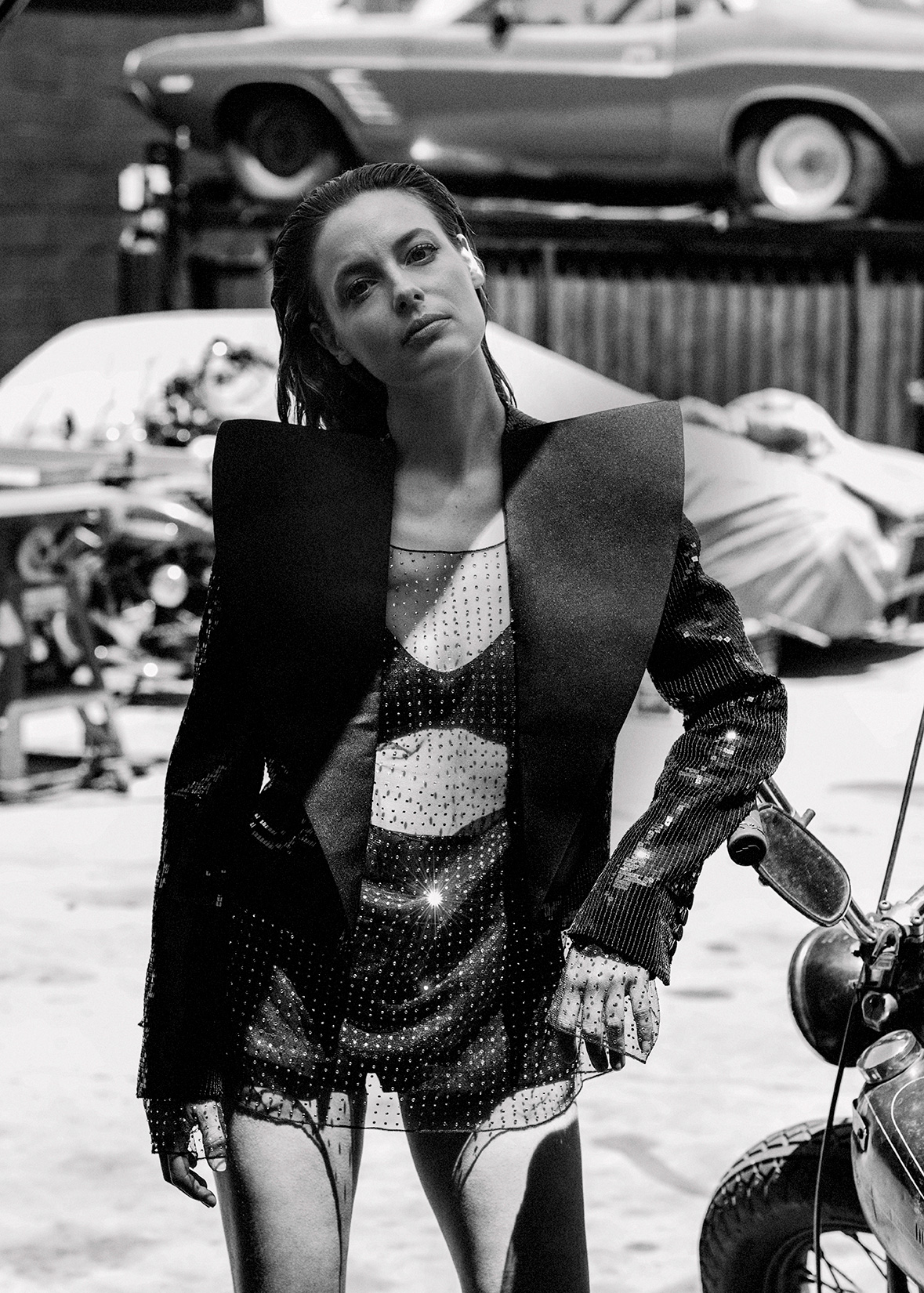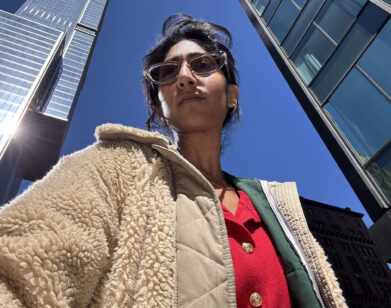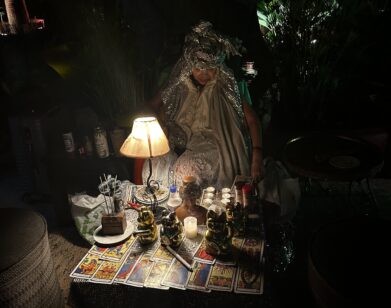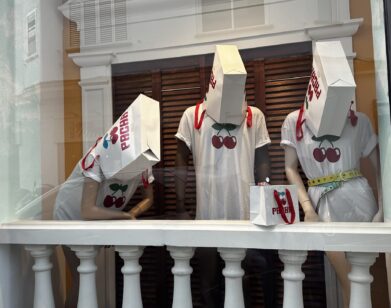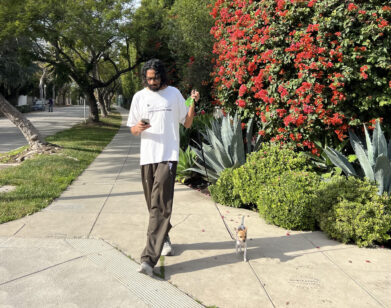Gillian Jacobs Talks to Alison Brie About the Highs and Lows of Being an Actor
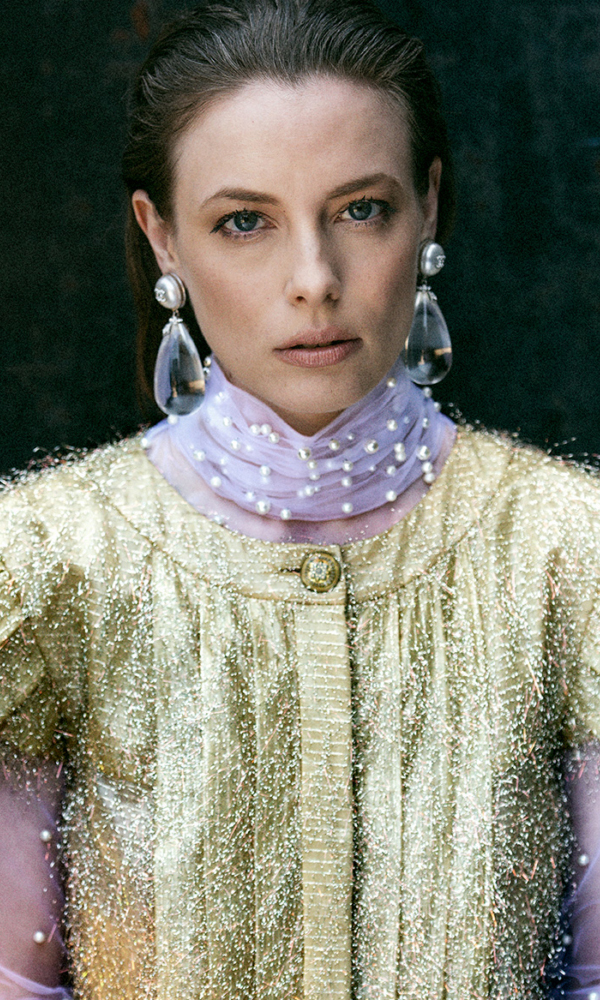
Earlier this year, Gillian Jacobs’s career came full circle. After making a name for herself in movies and television from her home base in Los Angeles, the 35-year-old actor returned to New York City to star in a two-month production of the play Kings, at the Public Theater. For Jacobs, it was a homecoming of sorts. Before anyone knew her as Britta Perry on NBC’s Community, or as Mickey Dobbs on Netflix’s realistic rom-com Love, Jacobs was training to become a theater actress at the grueling Juilliard School, an experience that, as Jacob tells it, did more damage than good.
Determined to make the acting thing work, the Pittsburgh native pivoted to on-camera work, landing her first break as a stripper named Cherry Daiquiri in the Chuck Palahniuk adaptation Choke. It was the first of many loveable misfits she would come to embody, playing against her more wholesome, real-life persona. In 2009, she was cast as a series regular on Community, NBC’s wildly creative sitcom that garnered a devoted fan base which stuck with the show even after it was cancelled by the network and later revived by Yahoo. And while many would have liked to see Community live on (rumors of a revival are constantly swirling), it was enough to showcase Jacobs as a gifted comedian, a skill that no doubt appealed to the creators of Love, who wrote the part of chain-smoking, foul-mouthed Mickey Dobbs with Jacobs in mind.
Now that Love has finished its three-season run, Jacobs is branching out into movies, with a role as a sorority girl in the Melissa McCarthy vehicle, Life of the Party, and a star turn in the upcoming Netflix comedy Ibiza (May 25) where she plays a woman who, along with two friends, tries to hook up with a DJ on a work trip gone wild. Jacobs recently reconnected with her friend and Community co-star Alison Brie in her empty Los Angeles home to talk about the highs and lows (but mostly the highs) of being an actor.
ALISON BRIE: We’re sitting in the the beautiful backyard of Gillian’s new home that’s completely empty. Devoid of furniture.
GILLIAN JACOBS: Yup, just how I like it.
BRIE: And you’ve just returned from New York where you were performing the play Kings. What did it feel like being back?
JACOBS: It was really weird. I was walking down the street with my mom and she was like, “I remember walking around this block with you, and you were complaining about something 10 years ago, and you’re still doing the same thing.” [Brie laughs]
BRIE: Still complaining, just about new and different stuff. You were doing the play while the final season of Love was airing. What was that like? I would imagine it was nice to be working. [laughs]
JACOBS: I always like having a place where I’m expected. People are waiting for me somewhere. It’s important if I show up or not. [laughs] But on the other hand it was really weird, because I didn’t get to see anyone from the show. I felt like I was having this very isolated experience. But it was nice because people would come up to me in New York and say how much they liked it. It was very different from our Community renewal adventures. [laughs]
BRIE: Ugh. Did you know it was going to be the final season when you started shooting?
JACOBS: Not when we started, but it was sort of midway through the season when they conceived of the last episode. So I didn’t go into starting the third season knowing it, but by the time it ended, I was like, “Okay, we’re done.”
BRIE: And what was the vibe like?
JACOBS: You know how when you’re rushing to accomplish something on set that you don’t really have time to think? They wrote such an ambitious last episode, so we only had a certain number of days on Catalina to get it all. And almost everything was daylight dependent, so you’re just running from scene to scene, and you’re not really taking it in as, “These are the final moments of the show.” It was this delayed grieving process for me, of like, “Okay, we wrapped it, that means it’s over. We finished ADR, that’s another thing that’s done. Now it’s out.” I feel like I keep mourning it in stages.
BRIE: The grieving process happens almost more when you’re watching the episodes.
JACOBS: Yes!
BRIE: I think about Community being so tumultuous, to say the least. But because we had been through [Community creator] Dan Harmon getting fired, rehired, the show getting cancelled, getting re-picked up, that we were all so exhausted, I think that we were all kind of ready for it to be over. Even though we loved each other, it always felt like the show was getting ripped out of our hands, versus something where people know in advance and have the time to finish it the right way.
JACOBS: I had never been exhausted like I was shooting Community, but then also just so passionately fighting for the show’s existence at all times. There is something nice, too, about having a show that is shorter. You tell this story, and then it’s done. Community was basically a live-action cartoon, so we’re not following the emotional life of those characters from episode to episode. Whereas with Love, the next episode would begin minutes after the previous one ended, so you’re charting it so carefully.
BRIE: What you think about the difference between Britta [Perry from Community], and Mickey [Dobbs from Love]? How was it playing those two characters?
JACOBS: It was weird. I don’t know how you felt when you started GLOW, but I felt such intense first-day jitters starting Love.
BRIE: Yeah, the stakes were much higher because I had a larger role on the show, and I wanted so badly to break out of the Annie character from Community that people so identified me with.
JACOBS: When you’re starting a new TV show, it feels like you’re making more long-term decisions about how you’re playing the character without really knowing what the show is. In that way I felt way more nervous. And just little things, like I don’t smoke, and wanting to look convincing that I’m smoking. Or having to smoke weed. I don’t smoke weed, so I was like, “I don’t know how to do this!”
BRIE: I thought you did great. I was very impressed.
JACOBS: Thank you so much! [laughs]
BRIE: I feel like not a lot of people know that you don’t smoke weed or drink, and I hope that’s not something you’re trying to keep a secret.
JACOBS: No, it’s totally fine to tell the world.
BRIE: Is it fun to play a character that’s so different from you?
JACOBS: Yes, it gives me the ability to act out in a way that I don’t give myself permission to in real life. It’s a very safe place to do and say whatever impulse I might’ve had that I don’t allow myself to in real life, like telling people to go fuck themselves. But I totally had imposter syndrome, of like, nobody’s gonna buy me as this character, because I’m so not this person in my real life. I’m much more like Paul [Rust]’s character on Love.
BRIE: That’s so funny.
JACOBS: I like rules, and I like people in positions of authority to like me. I’m not a rule-breaker, so for a long time I wondered why people cast me in these parts.
BRIE: Do you love working for Netflix? [both laugh]
JACOBS: Yes, I love working for Netflix.
BRIE: Me, too. I just want to get it on the record that I love working for Netflix. I’m newer to it. We’re still in that romantic period together.
JACOBS: Yes! And I’m very excited about my film, Ibiza, with Netflix. Thank you Netflix.
BRIE: Let’s talk about Ibiza. You shot it in Croatia and Serbia.
JACOBS: Yeah, nowhere near Ibiza. [both laugh]
BRIE: What was that like?
JACOBS: It was great, but we would have to move every couple of days to another island in Croatia because they’re trying to create Spain, so they could only shoot certain scenes on certain islands.
BRIE: That sounds awful. [laughs] You’re moving hotels every couple of days? That is my nightmare. I think people often perceive actors shooting on location to be very glamorous and fun, but your hours of work don’t change—it’s still 12 to 14 hour days—so it’s not like you’re laying out on the beach enjoying whatever country you’re in.
JACOB: And the other actresses, Phoebe [Robinson] and Vanessa [Bayer] were like, “Let’s go to Budapest,” and, “Let’s go to Paris,” and I was like, “I don’t think production’s going to let us go anywhere.” And then they’re like, “Um, no, we technically can’t stop you from travelling, but we would sure appreciate it if you didn’t go anywhere.” And plus you’re just exhausted.
BRIE: I was gonna say, I always feel exhausted.
JACOBS: My vision of being on location is crying in a hotel room somewhere. [laughs]
BRIE: I’m such a routine person, like you. As soon as I get anywhere—it could be the most exotic location—I immediately try to form my normal routine that I have at home.
JACOBS: I would make the same instant oatmeal in my trailer, every morning.
BRIE: What are your feelings about movies versus TV? I’ve finally succumbed to the idea that I just love working in TV, but there’s still the slightest bit of this perception that movie stars are in one tier, and TV is its own tier. That used to drive me really crazy, but lately, I’m just like, I love the long form telling of a character’s life and story. I love routine, I love going to the same job every year.
JACOBS: And you and I have also been lucky to work on our TV shows in the city where we live, which not all of our friends get to do.
BRIE: You went Juilliard. Did it feel nice to do theater again?
JACOBS: It did. I had such a horrible time at Juilliard that it kind of killed the dream I had as a kid, to be a theater actor. I didn’t feel like I could act on stage anymore, like they convinced me that I was no good. I did a couple of plays after college, and then it was 10 years in between the last play I did and this one. In the last 10 years, I regained my love of acting. I feel like Community allowed me to have fun.
BRIE: I feel the same way. After college, I worked on Mad Men, and I thought, “I guess I’m just gonna do dramas.” In school, it’s Shakespeare, and you’re playing the ingénue roles, but they’re all very boring. [both laugh] But they feel important, and not knowing my identity yet as an actor, we got on the set of Community, and it felt like it would when I joked around with friends when I was 12 years old. My truest self was alive when we were all joking around between takes.
JACOBS: That was really the special thing about that group of people, was that I felt like I could make the weirdest, dumbest choice as an actor, and everyone would celebrate it. I had no background in comedy so I was intimidated when they would give me a physical bit or when I would have to sell a joke. I know it’s funny, but I don’t know how to deliver it, so I would just steal from everybody.
BRIE: Me too! We had so many funny people around us, and different types of funny. I’d steal from the bits people would do between takes, which is a stealthy kind of stealing because the audience isn’t always seeing it. It was like comedy boot camp. There wasn’t any punishment for going too far. It was the show’s magic. Tell me about Life of the Party.
JACOBS: It’s about Melissa McCarthy going back to college and joining her daughter’s sorority. So we’re all in a sorority, and my character was in a coma, so that’s why I’m older than the rest of them.
BRIE: Oh, good, that makes me so relieved. I was like, “Oh my God, Gillian’s still playing a college student?”
JACOBS: Fuck no.
BRIE: “I have to call my agents!”
JACOBS: Not at all. I think you and had this experience where for a long time, we were the youngest, so it’s a funny thing to be like, “I’m not the youngest anymore.”
BRIE: Totally. I went to the [California Institute of the Arts], so I’m fascinated by normal colleges. What research are you doing to be in a sorority?
JACOBS: I’m such a lazy actor, so I did none, other than being constantly like, “I don’t know what any of this is. Is this a real thing people do?” We didn’t even have a campus at Juilliard. It’s one building.
BRIE: CalArts, too. It’s one building, one large driveway, and then two housing buildings, and that’s it.
JACOBS: Juilliard’s in the Lincoln Center. My whole college life was walking from the dorm to the school and back, and that was it. After my freshman and sophomore years in college, I went and took classes at colleges, just so I could be on a campus.
BRIE: You did? What college?
JACOBS: After my freshman year, I went to Harvard, and then University of Chicago.
BRIE: You went to Harvard? How have I never known this?
JACOBS: It was just like, you pay, and you can take classes there in the summer.
BRIE: What classes did you take?
JACOBS: I took a Civil War history course, and a twentieth century American literature course. And then at University of Chicago, I took a pre-Socratic Greek philosophy course, and a Southern literature course.
BRIE: Woah. Did you ever seriously consider leaving Juilliard to do a regular program?
JACOBS: Well, when they were telling me they might kick me out, it was a distinct possibility. [laughs]
BRIE: “Oh, I guess I could go to Harvard as back up.”
JACOBS: That was the scary thing about Juilliard—none of their credits transfer.
BRIE: CalArts is the same, because we would just get a pass or a fail. Or a high pass, or a low pass if you were going to get in trouble. I did not get low passes.
JACOBS: I did. I was nearly kicked out, so it was this real possibiliy of, if they kick me out of this place, I’m gonna have to start all over again, and reapply for college, and then none of my credits will transfer, so I’ll basically be a freshman all over again with two years of college under my belt.
BRIE: That’s so scary. And did you think you would just try to go to another theater program?
JACOBS: I placed so much importance on their validation that I thought, if they kicked me out, I’m not supposed to be an actor. Even though there’s so many actors who got let go from Juilliard and went on to have incredibly successful acting careers. It actually means nothing, but I’m such a people pleaser, authority figure pleaser, teacher’s pet.
BRIE: How did you turn it around?
JACOBS: I was just so afraid of getting kicked out that I somehow got through that year. And it kind of killed my joy for acting. So then I felt stuck in this mindset of, “I can only be an actor because I studied acting.” It wasn’t until Community, that I was like, “Oh yeah, I do like acting.”
BRIE: Yeah. And now, do you feel like, “Look at me now, Juilliard! Fuck you!” [Jacobs laughs] Are they asking you to speak at alumni events?
JACOBS: No. I’m sure they’d love me to give them money, but they’re not desperate for me to return. Especially after I wrote that essay for Lenny Letter about what a hard time I had there.
BRIE: They’re aware of your true feelings.
JACOBS: Yes. I don’t know if it has reached the hallowed halls of the faculty, but certainly other students there have reached out to me to say they read it.
BRIE: But you must feel proud to have overcome that fear..
JACOBS: Yeah. Doing this play was the first time I’ve felt good on stage because even those plays I did before Community, I still had that judgement of Juilliard so front of mind.
BRIE: I’m gonna ask you one more thing, about working with women. Do you make a conscious choice to work with more women or is it something that just happened?
JACOBS: I feel like it’s slightly easier than it was 10 years ago to get these projects made, that are led by women. I found it refreshing that the projects I have now—Life of the Party and Ibiza— are not about women fighting over guys. It didn’t bum me out to shoot them.
BRIE: Always a good sign. It’s not like as an actress, I’m sitting and going, “I only want to work with women!” But, once you begin to get access to great projects for women, where there are many well-rounded female characters, it’s hard to go back in the other direction. When I read stuff now that has a really one-dimensional female character, or two female leads, but all they talk about is a guy, it does bum me out. GLOW, is so different from anything I’ve worked on, and because there are women in the cast, obviously, and then, there almost all female writers on the show and a lot of women on our crew.
JACOBS: And female directors, too.
BRIE: Yes. You feel real ownership of the set. And I just think there’s better communication, and a thoughtfulness to the way we make the show, because our showrunners are women, so if you’re ever bumping on an idea, or something your character’s doing or saying that is rubbing you the wrong way—it doesn’t mean that they’re gonna change what she’s doing, but they’re very willing to have a discussion with you about why they think it’s important that she’s doing that.
JACOBS: The experience of having female directors direct a love scene felt so different to me. Lynn Shelton, who also directed GLOW, directed some of Love, and having her direct sex scenes on Love was such a completely different experience, like the way she was thinking about it, and wanting to have conversations with me weeks out in advance, like talking about, is this accurately depicting female pleasure?
BRIE: I would say the same about Jesse Peretz, who directed our pilot, and my first nude scene.
JACOBS: And me on Girls!
BRIE: Yes! And for me to take a risk like that, it was something I really wanted to do for this show, it seemed to have a purpose and a different meaning in this context. And, it was treated so delicately and maturely.
JACOBS: Even just walking onto the set and seeing how Lynn lit the room, I was like, “Woah. This is completely different.”
BRIE: Absolutely. And also, sharing with me what the shot was gonna be, what the coverage was gonna be. I was just talking to an actress who was sharing a story from 15 years ago about being surprised into doing a nude sex scene, and when she asked the director what the shot was, he told her, “You’re an actress, you don’t get to know what the shot is. Your job is to be naked and be in the scene.” So, we’ve come a long way to have someone say, “Here’s the shot, come look at the monitor.” The worst thing about any scene you’re shooting is the helplessness of not knowing what take they’re gonna use, what angle they’re gonna feature until you see it way later.
JACOBS: It is so cool that one of my oldest friends, Carly [Mensch] created a show with Liz [Flahive] that you are on. I feel such pride about it.
BRIE: Well, I’m very proud of you as well.
JACOBS: And, we’re hugging.
BRIE: We’re hugging and no one will know.
JACOBS: That’s a wrap.

